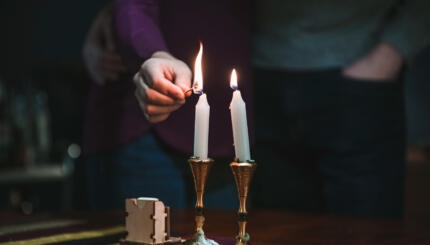The Amidah always begins and ends with the same paragraphs, while the middle section—the most important part of the prayer—changes to suit the occasion. In the case of the Musaf Amidah, there are three blessings in this middle section: Malkhuyot (kingship), Zikhronot (remembrance) and ot (shofar). These blessings represent the basic themes of the day. They were, at one time, part of the morning service and were only later transferred to Musaf.
Note: The focus of this article is on the additional service of Rosh Hashanah. Reform Judaism does not follow the practice of having an additional Amidah; it has moved the elements of the service discussed in this article back to the morning service.
In ancient times, the core of these three blessings existed as an independent prayer for Rosh Hashanah that was connected to the sounding of the shofar. They may have been created even prior to the destruction of the Temple and only later were incorporated into the framework of the Amidah. The blowing of the shofar, as we have seen, was the main ritual performed on Rosh Hashanah and the only one mandated by the for this day. During the Second Temple period, the sounding of the shofar was introduced by a series of biblical verses that conveyed the purpose and intent of the act. As the teaches:
No less than 10 kingship verses, 10 remembrance verses and 10 shofar verses must be recited…. We do not recite remembrance, kingship, and shofar verses that are punitive in nature. We begin with verses from the Torah and conclude with a prophetic verse. (Mishnah, Rosh Hashanah 4.6)
While the Mishnah (compiled around 200 CE) does not describe a fixed list of verses to be recited, this text does insist that any verses read on this day contain the proper theme and be positive in nature. Even after the Malkhuyot, Zikhronot, and Shofarotsections were incorporated into the Amidah,it remained the prerogative of the individual to choose the verses to be recited. Eventually, specific verses were chosen and became a fixed part of the service.
With your help, My Jewish Learning can provide endless opportunities for learning, connection and discovery.
Why these three themes of kingship, remembrance, and shofar? In the case of Zikhronot and Shofarot,the origin may be traced to two biblical verses, “…a sacred occasion commemorated [zikhron] with loud blasts [teruah]“(Leviticus 23:23) and “You shall observe it as a day when the horn is sounded [teruah]“(Numbers 29:1). The third theme, that of kingship, is not explicitly mentioned in connection with the first of Tishrei. Nonetheless, rabbinic interpretations attempted to find it in various verses.
And on your joyous occasions, your fixed festivals and new moon days, you shall sound the trumpets over your burnt offerings and your sacrifices of well‑being. They shall be a reminder of you before the Lord your God: I the Lord am your God. (Numbers 10:10)
According to Rabbi Nathan, “you shall sound the trumpets” refers to the shofar, “they shall be a reminder of you” refers to remembrance, and “I the Lord am your God” refers to kingship.
The meaning of “remembrance” in the verse “a sacred occasion commemorated with loud blasts” (Leviticus 23:23) is not entirely clear. The biblical scholar Baruch Levine suggests that it literally means “commemoration by blasting the shofar…. The horn was blasted to announce the forthcoming pilgrimage festival. Leon J. Liebreich argues that “the first day of the seventh month is a day of arousal of God’s mindfulness by means of the sounding of the ram’s horn.” M. M. Kalisch, on the other hand, states that “the loud notes…were meant to rouse God’s mercy in [the people’s] favor, who would remember His people and grant them His blessing and protection in the coming year.”
The notion of remembrance is also connected with war in the biblical text, “You shall sound short blasts on the trumpets, that you may be remembered before the Lord your God and be delivered from your enemies” (Numbers 10:9). God’s “remembrance” here indicates that God will not abandon His people, but will help them. The text continues, “And on your joyous occasions, your fixed festivals and new moon days, you shall sound the trumpets…they shall be a reminder of you before your God” (Numbers 10: 10). The juxtaposition of these two verses suggests that Israel evokes God’s remembrance to achieve success and to remind God to fulfill His promises to them.
Whatever “remembrance” may have meant in the original biblical context, the Sages interpreted it, along with “kingship” and “shofar,” in their own way:
First proclaim Him “king” over you, then ask mercy from Him so that you will be remembered by Him. How? By the shofar of freedom. “Shofar” always indicates freedom, as it is said, “And on that day, a great ram’s horn shall be sounded; and the strayed who are in the land of Assyria and the expelled who are in the land of Egypt shall come and worship the Lord on the holy mount, in Jerusalem.” (Isaiah 27:13)
The order of the three themes, and the relationship between them, are therefore explained as follows: We accept God as our ruler, we ask to be “remembered” by God (that is, we ask that God fulfill His assurances and help us), and we declare our desire for redemption—for individual and national freedom—symbolized by the sounding of the shofar.
This article is excerpted with permission from Entering the High Holy Days. It is reprinted with permission from the Jewish Publication Society.



